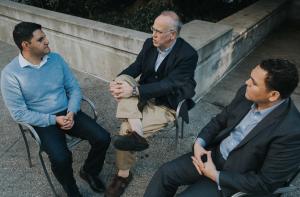In yesterday’s post, I began thinking about contentment in light of the creation narratives in the Bible. Genesis 1 reveals that human beings were created by God in God’s own image. Thus, we are intrinsically to be involved in the creation, exercising the abilities God has given us in his world. This is made explicit when, after creating human beings, God tells them to be fruitful, multiply, and have dominion. True contentment will come when we fulfill this divine vocation.
I realize that what I’ve just said will upset some Christians who say things like: “I am completely fulfilled through my relationship with Christ” or “Jesus is all I need.” I’m suggesting that you won’t be completely fulfilled simply by being in relationship with Christ, however wonderful and essential this may be. Moreover, I’m saying that Jesus is not all you need, if by this you mean that you would be perfectly happy just to sit and pray and worship for the rest of eternity. On the contrary, Genesis reveals that we were created in God’s image to work in God’s world as co-creators (in a lesser fashion), fruit-bearers, and those who exercise authority over creation.

This picture of human life is confirmed in the second chapter of Genesis. Hence, the title of this blog post: “Creation, Contentment, and Work: Chapter 2.” In this chapter, God created the man and put him in the garden (Gen 2:7-9). God did this so that the man might “till” and “keep” the garden (2:15). This is a different perspective on the basic command of Genesis 1 to be fruitful and have dominion. The man was created to work in God’s good creation.
If you were to stop right there and ask: How can the man honor God? You’d answer something like: By doing what God created him to do, namely, work. At this point, there is no hint that the man might also stop working for a while in order to pray or praise God. That comes later. But nothing so far in the creation story suggests that man’s key function in life is worship as we usually define it. Nor would you be inclined to believe that contentment comes purely through the man’s relationship with God. Work is central to human worship and human happiness.
What comes next in Genesis 2 is a shocker. God says: “It is not good that the man should be alone; I will make him a helper as his partner” (2:18). Wait just a minute! God says it’s not good for the man to be alone. But doesn’t the man have God? And, given that the man hasn’t sinned, he is able to have intimate, unfettered relationship with the living God? Isn’t that enough? No, apparently not, as far as God is concerned. The man was not created simply or even primarily for one-on-one relationship with God. Rather, then man needed a unique partner to join him so that he might fulfill his calling to work in the world. Thus, a few verses later, God created a woman to be the man’s partner.
Genesis 2 does not speak specifically of contentment. But it strongly suggests that we will only be content as human beings when we fulfill our purpose (to work) and do so in relationship with other human beings. So, in light of this passage, it would not be theologically corrected to sing “All I need is Jesus” or “You’re all I need.” In fact, I need to be the person God created me to be. I need to do what God has created (and redeemed) me to do. I can only do this in and through God, to be sure. And simply doing things apart from God, even very good things, will not bring full contentment. But contentment comes when I am in relationship with God, doing all things through Christ who empowers me (Phil 4:13).
“Hold on here,” you may be thinking. “You’re a Presbyterian pastor. You should affirm, among other things, the classic answer to the first question of the Westminster Shorter Catechism, which reads: ‘What is the chief end of man? Man’s chief end is to glorify God, and to enjoy Him for ever.’ Yet you’re saying that human beings have another chief end, maybe a more essential chief end, that is, to work. How can you say this?” I’ll try to explain myself more thoroughly in my next post.












